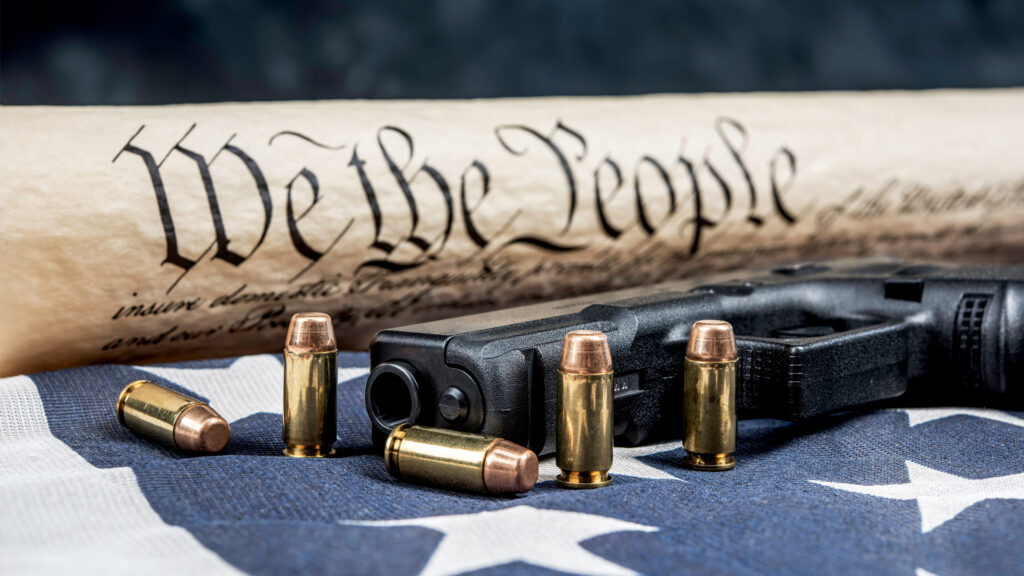
Michigan’s Red Flag Law, officially known as the Extreme Risk Protection Order (ERPO) Act, has been a source of intense controversy since its enactment in early 2024, especially among gun collectors, NRA members, and Second Amendment advocates. The law allows anyone from family members, police, mental health professionals, roommates and former dating partners to anonymously petition a judge to remove firearms from those they believe pose an imminent threat to themselves or others.
In just it’s first year, this new ERPO has come under scrutiny from lawmakers seeking its repeal. What makes Michigan’s Red Flag law particularly alarming is that firearms can be seized before a person has a chance to defend themselves in court. For many, this raises serious concerns about due process, false claims, and the potential for abuse, making it crucial for gun owners to understand their rights and stay informed.
Understanding the Who, What, and How of Michigan’s Red Flag Law
While the intension of the ERPO Act is intended to temporarily remove guns from people with potentially violent behavior and prevent them from hurting themselves or others. This has obvious good intensions in regards to victims of domestic violence, and those showing signs of being a danger to the public, but how the law is written leaves many to question its constitutionality. Who can file a petition? Based on what grounds? Can law enforcement actually take my property without due process? Understanding these key details is crucial for anyone concerned about their Second Amendment rights. Here we have highlighted everything you need to know to ensure you’re as informed as possible.
For a deeper look at the law: Download Complete Overview of Michigan’s Red Flag Law (PDF)
Who Can File an ERPO Petition?
The petitioner must fit into one of the following categories:
- Spouse of the respondent
- Former spouse of the respondent
- Individual who has a child in common
- Individual who has or had a “dating relationship”
- Individual who resides or has resided in same household
- “Family member”
- “Guardian”
- “Law enforcement officer”
- Health care provider
Penalties for Making a False Report
There are penalties for abuse of this law. If the petitioner knowingly and intentionally makes a false report they can be subject to a range of punishments, including a 93-day misdemeanor for first offense, 4-year felony for second offense, and 5-year felony for third and subsequent filing of false reports.
Learn What it Takes to Restore Your Second Amendment Rights.
Factors Considered When Issuing Order
The petitioner must show that the respondent (person receiving the order) can reasonably be expected within the “near future” to intentionally or unintentionally seriously physically injure themselves or another individual by possessing a firearm. The respondent must have also engaged in an act, or acts, or made significant threats that support this expectation.
When considering a request, the Court considers the following factors for issuing an order to respondent:
- History of use, attempted use, or threatened use of physical force, regardless of whether it involved a firearm.
- Serious Mental Illness & Emotional Disturbance
- Previous convictions including:
- Assault and Battery
- Stalking / aggravated stalking
- An offense involving cruelty or abuse of animals
- Abuse of controlled substances and/or alcohol
- Prior ERPO/PPO violations
- Any prior unlawful possession, use, display, or brandishing of a deadly weapon
Requirements of Order
- Firearms Surrender – The restrained individual must surrender firearms in their “possession or control” within 24 hours, or immediately, as determined by the court.
- Purchase or Possession of Firearms – The restrained individual must not purchase or possess a firearm and must surrender any unused License to Purchase (LTP) that is not yet void.
- Concealed Pistol License (CPL) – The restrained individual shall not apply for a CPL and any existing CPL will be suspended or revoked, and they must surrender the CPL as required.
- Motion to Modify or Rescind – A statement that the restrained individual may file a motion to modify or rescind the order as allowed under the ERPO Act.
- Right to Attorney – A statement that the restrained individual has the right to seek the advice of an attorney.
- Expiration Date – An expiration date that is 1 year after the date of issuance.
Immediate vs Non-Immediate Surrender
Non-Immediate Surrender
- If the court does not order the immediate surrender of the restrained individual’s firearms, the petitioner must serve the ERPO as provided and file the proof of service with the court within 1 business day.
- If ordered by the court, the respondent must surrender any firearms in their possession or control to the designated law enforcement agency within 24- hours.
Immediate Surrender
- If the court orders the immediate surrender of the restrained individual’s firearms, a law enforcement officer must personally serve the ERPO.
- The respondent must immediately surrender any firearms in their possession or control to the law enforcement agency
- If the restrained individual has not been served, a law enforcement officer who knows the order exists may do either the following:
- Serve the restrained individual with a true copy of the order.
- Advise the restrained individual of the existence of the order, the specific conduct enjoined, the penalties for violating the order, and where the restrained individual may obtain a copy of the order.
Failure to Comply
An individual who refuses or fails to comply with an ERPO is guilty of a felony, which includes 1-year felony for first offense, 4-year felony for second offense, and 5-year felony for third and subsequent offense.
If convicted, the court that issued the order shall issue an extended ERPO effective for 1 year after the expiration of the preceding order.
An individual who knowingly places a firearm in the possession of an individual who is restrained under an extreme risk protection order is guilty of a felony punishable by imprisonment for not more than 1 year or a fine of not more than $1,000.00, or both.
Options For Fighting Red Flag Order
A restrained individual may file one (1) motion to modify or terminate an ERPO during the first six months and one motion to modify or terminate during the second six months. If the ERPO is extended, the restrained individual may file two additional motions during each of the respective six (6) month periods.
If terminated, the court order must state that respondent may reclaim any seized firearms.
After One Year – Red Flag Law Facing Repeal
An annual report was released in February providing the 2024 statistics under its first full year, showing that a total of 391 ERPO requests made in 2024, with 287 requests being approved. Most requests were emergency requests, permitting temporary confiscations before holding a hearing. Its these cases that trigger much of the opposition to the law, as they only require suspicion, based on what “might happen”, not that a crime has happened.
On March 5th, State Rep. James DeSana introduced a pair of bills to repeal the ERPO law, stating that it violates multiple constitutional rights, including our Second Amendment rights, as well as the Fifth and Fourteenth Amendments.
Call to repeal Michigan’s Red Flag Law- Read More
Protecting Your Rights
Understanding Michigan’s Red Flag law is essential for anyone concerned about protecting their Second Amendment rights — especially if you’ve had past legal issues and are working to restore your firearm privileges. Our legal team specializes in helping Michigan residents navigate this process and fight unfair accusations.
If you or anyone you know has been effected by Michigan’s Red Flag Law, contact the Law Offices of Barton Morris today.
Read More About Michigan Firearm Rights
- For more information on how we help you with firearm rights restoration.
- Michigan’s Red Flag Law Unconstitutional? Lawmakers Announce Push to Repeal
- Learn about how Michigan’s Clean Slate Law may affect your firearm rights.
- Understand Your Concealed Carry Rights After a Domestic Violence Conviction
- Michigan Firearm Restoration Proceedings
- What if a Felon Wants to Carry a Firearm to Hunt?

